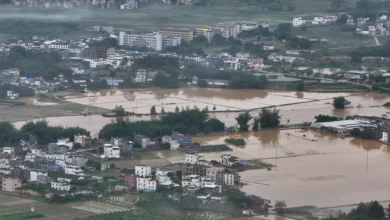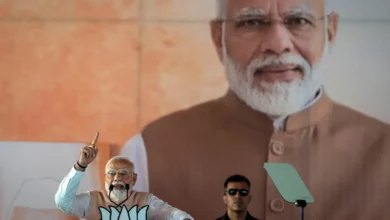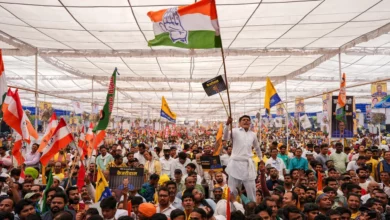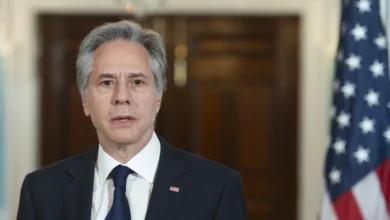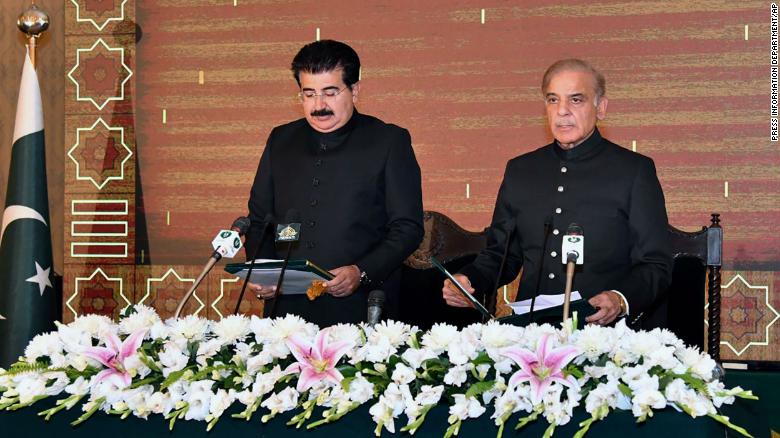
(CNN) – Pakistan’s new leader Shehbaz Sharif called for “unity” and vowed to repair the country’s damaged economy after he was sworn in as Prime Minister Monday following the ouster of Imran Khan.
Former opposition leader Sharif, 70, is set to serve as Prime Minister until the next general election, expected in 2023.
He was elected by Pakistan’s parliament after former cricket star Khan was dismissed as Prime Minister in a no-confidence vote that had threatened to set off a constitutional crisis. For weeks Sharif had been leading a campaign to remove Khan over allegations of poor governance and economic mismanagement.
Sharif’s rise has been mired in political conflict, and critics say he now faces the daunting task of reviving a flailing economy and maintaining important relations with key countries against the backdrop of widespread protests in favor of Khan.
“It has been a historic (few weeks), with our young and fragile democracy being tested to its very limit,” said Hassan Kamal Wattoo, a lawyer and columnist based in the capital, Islamabad. “What we can only hope is at the end of this constitutional crisis, our democracy is left shaken but standing.”
Who is Shehbaz Sharif?
A steel dynasty scion, Shehbaz Sharif is the younger brother of Nawaz Sharif, a three-time former Pakistani prime minister. The family’s fortune derives largely from the Ittefaq Group steelmaker co-founded by their industrialist father, Muhammad Sharif.
Shehbaz Sharif first rose to power as the chief minister of Pakistan’s politically important and most populous province of Punjab in 1997, and was praised by many in the province for his good governance.
But his term was cut unexpectedly short in 1999 when former Gen. Pervez Musharraf led a military coup against his elder brother, due in part to a breakdown of relations between the government and the powerful military. Shehbaz Sharif was briefly imprisoned in Pakistan, before going into self-imposed exile in Saudi Arabia with his family.
He returned to Pakistan in 2007, and was reelected chief minister of Punjab the following year. His tenure proved popular with many in Punjab for its ambitious infrastructure projects, and advances in education and industry.
But Sharif’s family was embroiled in scandal in 2018 when his elder brother was sentenced to 10 years in prison and handed a $10.5 million fine for corruption.
Nawaz Sharif denied the charges, but was barred by Pakistan’s highest court from holding political office. Shehbaz Sharif took over from his elder brother as leader of the Pakistan Muslim League-N (PMLN) party, but faces unresolved corruption charges, which he denies.
For much of Khan’s term, Sharif led a campaign to remove him as prime minister. In recent months, it escalated, with Sharif and the opposition accusing Khan of economic mismanagement and urging him to resign.
In a dramatic series of events, the deputy speaker in parliament blocked the no-confidence vote against Khan, who then dissolved parliament and called for early elections. The opposition challenged Khan’s moves in Pakistan’s highest court, with Sharif calling them “nothing short of high treason.”
The court ruled last week that the blocking of the no-confidence vote against Khan was unconstitutional, paving the way for re-run of the vote and for Sharif to become Prime Minister.
Repairing a damaged economy
Sharif now inherits an ailing economy, with inflation in the double digits. The cost of basic necessities such as food and fuel are skyrocketing, and the government’s foreign exchange reserves are fast depleting.
A poll released in January by Gallup Pakistan found 64% of respondents felt inflation was the biggest problem for the country.
Meleeha Lodhi, former Pakistan ambassador to the United States, Britain and the United Nations, said reviving the economy will be Sharif’s “biggest challenge and top priority.”
“There is pressure on the rupee which has been rapidly falling against the dollar and business confidence has plunged,” she said.
The International Monetary Fund (IMF) agreed in 2019 to provide Pakistan with a $6 billion bailout, but since then the program has experienced setbacks.
Lodhi said resuming the IMF program should be Sharif’s “main focus.”
“Pakistan urgently needs the funds,” she said.
Shortly after being sworn in, Sharif vowed to repair the economy.
“The economic challenges are huge and we need to make a way out of these troubles. We will have to shed sweat and blood to revive the economy,” he said.
How will Sharif’s term affect Pakistan’s foreign policy?
Khan ushered in a new era of foreign policy that saw Pakistan distance itself from the US, and move closer to China and Russia.
His unique brand of Islamist populism and anti-American rhetoric polarized the nation, with Khan blaming the US for the situation in neighboring Afghanistan, and most recently accusing Washington of conspiring with Pakistan’s opposition to remove him from power.
Analysts say Sharif now faces the challenging task of amending ties with the US without playing into Khan’s narrative — which has appeared to resonate with many of the former prime minister’s voters.
“Pakistan will have to work very closely with the Americans, there is no question about it. However, domestically, they will have to manage the optics,” said Happymon Jacob, founder of the India-based Council For Strategic Defense Research. “Pakistan has no option but to work very closely with the Americans, for the simple reason that Afghanistan needs to be stabilized.”
Unlike Khan, Sharif has not severed links with Washington, said Jacob, adding Pakistan is “likely to see an improvement of relations” with the US.
As his elder brother did, Sharif is also expected to maintain amicable relations with Pakistan’s largest South Asian neighbor, India.
In a speech to parliament Monday, Sharif stressed the need to “solve the crisis” in the disputed region of Kashmir, which has driven the two nuclear-armed states to war three times.
According to Jacob, his arrival “augurs well for India-Pakistan relations.”
“He has a close relationship with the leadership in India … and is pro-peace with India,” he said, adding that unlike Khan, Sharif has also maintained ties with India’s ruling Bharatiya Janata Party, paving the way for a “peaceful” year.
Another key relationship Sharif is expected to maintain is the one with China.
As Punjab’s chief minister, he was instrumental in driving the multibillion-dollar China-Pakistan Economic Corridor, a part of China’s Belt and Road infrastructure project, and maintains a positive relationship with Beijing.
“The relationship with China is very important for Pakistan from an economic point of view,” Jacob said. “The new government is not going to slow down that engagement and it will only increase over time.”
How will Sharif square off against Khan?
Sharif faces a tough challenge in quelling hostilities between his coalition government and Khan’s embattled Pakistan Tehreek-e-Insaf (PTI) party.
The PTI’s lawmakers all resigned en masse in protest on Monday, ahead of the prime minister vote.
“For better or worse, Khan is likely to be a thorn in the government’s side for much time to come,” said Wattoo, the lawyer.

